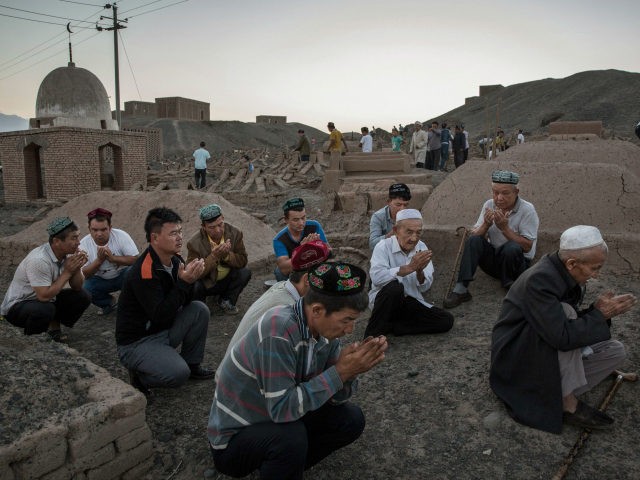China’s Xinjiang Uighur Autonomous Region is notoriously dotted with huge re-education camps for Muslims where very little autonomy can be found.
A survivor of the camps told Radio Free Asia (RFA) in an interview published on Monday that detainees are allowed one hour to weep every two weeks and are punished for weeping outside of the “crying sessions.”
The detainee, Guzire Awulqanqizi, is an ethnic Kazakh who was held in one of the camps from July 2017 to October 2018. Most of Xinjiang’s Muslims are of the Uighur ethnicity, but the province borders on Kazakhstan and has a significant Kazakh population.
Awulqanqizi said many of the inmates are reduced to tears by the stress of enduring 14-hour daily political indoctrination sessions with only two-minute toilet breaks for relief:
“They say, ‘Now you can cry,’ but if we cry at other times when we feel the need, they criticize and threaten us, saying they will move us to a different camp,” said Awulqanqizi, who now lives in exile in Almaty, in neighboring Kazakhstan.
“When we feel sad and cry, they say, ‘You cannot cry now—you can only cry when it is your allotted crying hour.’ At the crying hour, they shout at us, ‘Now you cry!’”
According to Awulqanqizi, authorities in the camps have established a crying hour because “they know we were suffering,” but even when detainees are permitted to express their emotions, “we have to cry quietly” while monitored by camp officials.
“They stayed and watched us,” she said, adding that each classroom was observed by five teachers and two police officers.
Classroom monitors would threaten detainees with electric batons and verbally abuse them if they cried outside of permitted crying times.
According to Awulqanqizi, the 14-hour political education sessions were followed each day with mandatory education in the Mandarin Chinese language before the detainees were allowed to sleep. They were forbidden to speak with each other and monitored “at all times” by cameras to ensure their obedience. Uighurs who live outside the camps are kept under extensive surveillance as well
Pakistani social media lit up in early May with reports that Xinjiang Muslims were forbidden from fasting during the Ramadan holiday. Chinese officials dismissed these reports as “Western propaganda” but admitted that some unspecified “partial restrictions” on religious observances were in effect.
Many Pakistanis are upset with the government of Prime Minister Imran Khan for not speaking more forcefully on behalf of China’s abused Muslims. Critics accuse Pakistan and other Islamic nations of “carrying water” for China by legitimizing its treatment of Muslims and preventing the Organization of Islamic Countries (OIC) from formally condemning China, motivated by China’s enormous investments in Middle Eastern countries under the Belt and Road infrastructure initiative.
The Wall Street Journal last week reported disturbing allegations that prisoners in the re-education camps are being used as slave labor and some American and European companies are buying the products that emerge from the “long, often opaque supply chains” that run through Xinjiang province.

COMMENTS
Please let us know if you're having issues with commenting.